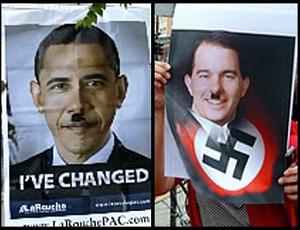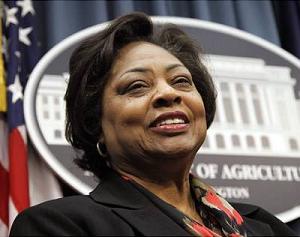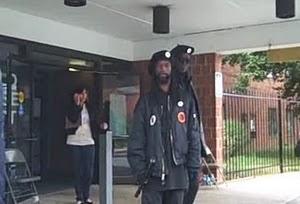Black Heritage 2011
 | | Nike now has special basketball sneakers in honor of Black History Month; you can decide for yourself how condescending and/or stereotypical that is |
My call for a Blue-Eyed History Month a few years ago never panned out, which means that February is still the time in which we Americans celebrate the history of black people. It also means that it's time for me to devote a week to discussing race relations in America. To briefly recap my points to date, here are some highlights:
1. The color of a person's skin should be no more relevant in modern society than hair color, eye color, height, and shoe size.
2. Black History Month is inherently divisive because it reinforces that black people are so different from the rest of us that they need their own segregated history books.
3. The word "race" (and all its derivations) is part of the problem, because we are all members of the same human race and cannot be divided into different races.
4. We teach our children to discriminate through things like Black History Month, the National Museum of African American History and Culture, BET, Tyler Perry movies, and of course the post-modernist rallying cry of "race, class, gender."
This year, rather than spend too much time rehashing those points, I thought I'd just skim some news from the last twelve months, sticking to stories that highlight the need for drastic change in how we think about race in this country. The problem, as I see it, is that we use and abuse racial issues for gain and it is too useful as a sleazy rhetorical tool to simply abandon it for the sake of a color-blind society. It's not just politicians, pundits, or leaders, either, nor is it just coming from one side of the political spectrum. It also can't be restricted to just "whites" and "blacks," though that is my primary focus here. It really is a problem that pervades all of our society and surpasses creed, color, politics, and shoe size; it is a problem that starts in all of us.
 | | Apparently, depending on who you talk to, only one of these is inappropriate |
I'll start with a current news story. Over in Wisconsin, people are rallying against the governor's proposal to limit the collective bargaining privileges of certain public employees in the state. Protests have been steady on the subject for over a week. On the surface, this news story has absolutely nothing to do with race, but I bring it up because, just shy of a year ago, similar protests were taking place in Washington over President Obama's healthcare bill. Many--including Rep. Clyburn of South Carolina, Nancy Pelosi, Harry Reid, Keith Olbermann, and dozens of columnists and editorialists from The New York Times and The Huffington Post, to name just a few--accused these protests of being inherently racist because there were statistically fewer black people among them than there are in the general population and because there were protests signs comparing President Obama to Adolf Hitler.
These accusations aren't being thrown around in Wisconsin, however, even though the protest crowds are predominantly white and there are signs comparing Governor Walker to Adolf Hitler. I'd like to think this is because we've learned our lesson and that we have all agreed that these things are hardly indicative of blatant racism, but I know that's not the reason. The reason is that the Democratic Party supports the protests in Wisconsin but opposed the protests over healthcare last year, and more importantly, because Scott Walker's skin is white while Barack Obama's is black.
Moving on, I'd have to give the award for most blatantly racist comment of the year to none other than Bill Maher, who said this charmer in May: "I thought when we elected a black president, we were going to get a black president. You know, this [BP oil spill] is where I want a real black president. I want him in a meeting with the BP CEOs, you know, where he lifts up his shirt so they can see the gun in his pants. We've got a motherfucking problem here? You know, shoot somebody in the foot." I should note he gave this incredibly offensive monologue to a cheering audience. The runner-up would be Glenn Beck, for arguing that President Obama wanted to pass the healthcare bill in order to get "reparations."
 | | It's really not fair how easy it is to find pictures of Glenn Beck acting completely insane |
And speaking of Glenn Beck, he and many other pundits on the right helped stoked the fires against things like gay marriage, the "Ground Zero Mosque," and the repeal of Don't Ask Don't Tell last year. These aren't issues of black/white racism, but they are issues very deeply involved with group-minded bigotry. Some were making cases that weren't based in Islamophobia or homophobia, but most of the vitriole was absolutely rooted in an us-versus-them mentality that is indistinguishable from racism. This would also be a logical place to insert the story of Terry Jones, but I'd wager that at least 99% of us can all agree that Jones is a douchebag undeserving even of this sentence.
Then again, President Obama, struggling to justify the war on terror, made the assertion that Al Qaeda is racist. He wasn't just arguing that Al Qaeda hates all non-Muslims, but that it actively acts in a way that is racist against black people. In truth, that may be true, and President Obama does make a compelling argument. Still, it seems a little absurd, as if we need a new reason to disapprove of the actions of Al Qaeda.
Next up is the unfortunate case of Shirley Sherrod. In July, two video clips were posted on BigGovernment.com by conservative Andrew Breitbart that appeared to show Shirley Sherrod--the Georgia State Director of Rural Development for the USDA--confessing to the NAACP that she discriminated against a white farmer specifically because of his race. In response to these videos, Sherrod was denounced by conservatives across the country (most notably Bill O'Reilly) and forced to resign her position. After the fact, a longer video came out that showed the full context of Sherrod's statements, in which she talked about how she overcame her initial racist reaction and did all she could to help the white farmer, even becoming strong friends with him in the process. President Obama publically apologized for the scandal and offered Sherrod a cushy job in his administration to make up for it, which she ultimately declined.
 | | Shirley Sherrod: definitely not racist |
The Shirley Sherrod story is especially worth noting because it shows how gut reactions and cries of racism can destroy lives much faster than the truth can protect them. Shirley Sherrod is the exact opposite of racist, and yet she was publicly disgraced and her life was turned upsidedown by nothing more than a video that appeared to make her out to be a racist. Her previous credentials, personality, character, side of the story, and reaction were irrelevant. All that was important at the time was the possibility that she treated black people and white people differently. This is unacceptable, and it is my greatest hope that we can permanently overcome this kind of nonsense in my lifetime. I know most people don't think that's possible, but thinking like that is exactly the problem.
It wouldn't be a decent accounting of racist news stories in the last year without bringing up the New Black Panther Party voter intimidation controversy. The story goes like this: on election day, 2008, two members of the New Black Panther Party, Minister King Samir Shabazz and Jerry Jackson, stood outside a voting station in Philadelphia. They allegedly intimidated potential voters as they arrived at the station, and Shabazz carried a billy club. According to multiple accounts, Shabazz pointed his billy club at people while both men shouted racial slurs. Shabazz was sent away by police, but Jackson was allowed to stay because he was a certified poll watcher. A criminal investigation was started about the incident after a video of the two men was posted on YouTube. The case was ultimately narrowed and federal involvement ceased entirely in 2009.
Last year, however, J. Christian Adams, an official with the Department of Justice, quit his job over the department's treatment of the case. He then penned an article for the Washington Times that snapped the story into the national spotlight. Adams accused the Obama administration of interference and his superiors of demanding that he ignore a subpeona from the Civil Rights Commission. The bottom line, according to Adams, is that the Obama administration (Eric Holder in particular) is unwilling to pursue cases involving minorities committing civil rights violations, that they wouldn't even think of hesitating to pursue the case if it involved members of the KKK rather than the New Black Panther Party. There is currently an investigation underway by the Civil Rights Commission, as well as an internal one by the Justice Department, but this hasn't stopped people from jumping to conclusions before all the facts are in, either accusing the Obama administration of reverse discrimination or accusing Republicans of overblowing a minor case. Again, this story serves to prove a point: where race is concerned, few people seem interested in actual facts over their own gut reactions.
 | | They're just there to make sure your vote gets counted |
There have been many such stories in the news. There's the case of the Oakland transit cop who was accused of shooting a black man on a subway without good cause. The cop was found not guilty, which started an overnight riot in Oakland. There's also the case of the Iowa fairgrounds attacks, where at least three young black men allegedly assaulted several white people. When police officers said that it was possible that the attacks had "racial overtones," people paid attention, as though the very fact that race has anything to do with it makes any story worthy of national attention.
But of course, race as an issue is at its hottest when it's being discussed on Capitol Hill. Whether it's accusations that finance reform bills contain racial quotas or questions as to why the president is having meetings exclusively for black journalists, there is plenty of worry about racism from our elected leaders. Our president promised to be a post-racial president and has had mixed results in fulfilling that promise. For every instance of President Obama refusing to include discriminatory language in a bill, there is an instance of him getting on his bully pulpit and needlessly injecting himself into a news story just because it appears to have a racial angle.
What all of these stories have in common is that they are all overreactions. Our own sensitivity to these matters is, it seems, the real enemy here, not racism itself. I'm sure there are stories out there of genuine and abhorrent racism--the National Alliance still exists, after all--but we aren't terribly interested in these stories anymore. The stories that make headlines are all inuendo and accusation, not straight-forward hate crimes. It's as if we spend more time pointing fingers at each other than actually working together to make Martin Luther King, Jr.'s dream come true.
So happy Black History Month, everyone! I'll report back next year to see if we've made any more progress toward true equality.
-e. magill 2/23/2011
|
|